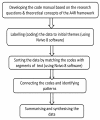Improving district level health planning and priority setting in Tanzania through implementing accountability for reasonableness framework: Perceptions of stakeholders
- PMID: 21122123
- PMCID: PMC3009977
- DOI: 10.1186/1472-6963-10-322
Improving district level health planning and priority setting in Tanzania through implementing accountability for reasonableness framework: Perceptions of stakeholders
Abstract
Background: In 2006, researchers and decision-makers launched a five-year project - Response to Accountable Priority Setting for Trust in Health Systems (REACT) - to improve planning and priority-setting through implementing the Accountability for Reasonableness framework in Mbarali District, Tanzania. The objective of this paper is to explore the acceptability of Accountability for Reasonableness from the perspectives of the Council Health Management Team, local government officials, health workforce and members of user boards and committees.
Methods: Individual interviews were carried out with different categories of actors and stakeholders in the district. The interview guide consisted of a series of questions, asking respondents to describe their perceptions regarding each condition of the Accountability for Reasonableness framework in terms of priority setting. Interviews were analysed using thematic framework analysis. Documentary data were used to support, verify and highlight the key issues that emerged.
Results: Almost all stakeholders viewed Accountability for Reasonableness as an important and feasible approach for improving priority-setting and health service delivery in their context. However, a few aspects of Accountability for Reasonableness were seen as too difficult to implement given the socio-political conditions and traditions in Tanzania. Respondents mentioned: budget ceilings and guidelines, low level of public awareness, unreliable and untimely funding, as well as the limited capacity of the district to generate local resources as the major contextual factors that hampered the full implementation of the framework in their context.
Conclusion: This study was one of the first assessments of the applicability of Accountability for Reasonableness in health care priority-setting in Tanzania. The analysis, overall, suggests that the Accountability for Reasonableness framework could be an important tool for improving priority-setting processes in the contexts of resource-poor settings. However, the full implementation of Accountability for Reasonableness would require a proper capacity-building plan, involving all relevant stakeholders, particularly members of the community since public accountability is the ultimate aim, and it is the community that will live with the consequences of priority-setting decisions.
Figures
References
-
- Klein R, Williams A. In: The global challenge of health care rationing. Coulter A, Ham C, editor. Buckingham: Open University Press; 2000. Setting priorities: What is holding us back-inadequate information or inadequate institutions? pp. 15–26.
-
- Ham C, Coulter A. In: Reasonable rationing: International experience of priority setting in health care. Ham C, Robert G, editor. London: Open University Press; 2003. International experience of rationing; pp. 4–15.
-
- Bryant JH. In: The Global Challenge of Health Care Rationing. Coulter A, Ham C, editor. Buckingham: Open University Press; 2000. Health Priority Dilemmas in developing countries; pp. 63–74.
Publication types
MeSH terms
LinkOut - more resources
Full Text Sources



